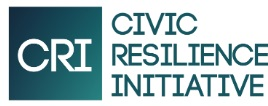It is important to note that AI also has great potential to tackle one of the biggest challenges of our time - disinformation. The advanced AI algorithms can quickly and accurately identify false information, contributing to more transparent and reliable information dissemination. This is particularly important in our digital age, where the flow of information is enormous and misinformation can have serious negative consequences for society.
To better understand how artificial intelligence is changing our lives and how it can be used to fight disinformation, we interviewed Evelina Kvietkienė, a lecturer of artificial intelligence. She helped us to answer the key questions about the benefits, challenges, and potential impact of this technology on our daily lives and the well-being of society.
Evelina, how do you assess the popularity of artificial intelligence in Lithuania? Have you noticed in recent years that more and more people want to learn about the possibilities of AI?
I have noticed that the popularity of artificial intelligence (AI) in Lithuania has increased significantly in recent years – and this is reflected in various indicators. One such indicator is the expansion of AI-related events, academic programs and start-ups, which is a clear sign of the growing interest in this technology. Lithuanian universities are actively integrating AI into their curricula, offering specialized courses and degrees, contributing to the growing number of students and professionals seeking to deepen their knowledge in this field. AI-related conferences, hackathons and community meetings are also on the rise, with more and more people interested in exploring the possibilities of AI.
This trend is keeping pace with global dynamics, where AI is becoming more and more important across industries and in everyday life. The Lithuanian government is also actively promoting the integration of AI as part of its national digital strategy, by funding research, supporting AI start-ups and working to deploy AI technologies in different sectors of the economy.
The media in Lithuania are also increasingly focusing on AI, highlighting its applications, ethical issues and prospects. For example, a recent forum organized by the Ministry of Culture and the "Create for Lithuania" program, “Knowledge algorithm: will avatars read Lithuanian news?” discussed the issues and challenges of applying AI in the media.
In conclusion, I would say that the popularity of AI in Lithuania is growing rapidly, driven by increasing public awareness, innovation in the start-up sector, government support and education. This trend reflects a global drive to deepen the understanding and application of AI in a variety of fields.
In which areas is the integration of artificial intelligence most significant in Lithuania? Is there sufficient public awareness of its capabilities and functions?
Over the past two years, the Lithuanian government has allocated €35 million to develop artificial intelligence (AI) technology products and digitize the Lithuanian language, demonstrating a strong commitment to the technology. These investments are already paying off, as Lithuania has gained international recognition: in 2023, the Government AI Readiness Index ranked Lithuania 35th out of 193 countries.
The Lithuanian public sector is also embracing AI innovations, with various public service organizations planning to deploy new technologies in a very responsible way. One example is the Employment Service, which has deployed a smart chatbot to provide 24/7 answers to improve customer service. Such solutions are becoming increasingly popular, and more and more Lithuanian companies are deploying chatbots and automated service systems, to help solve customer problems faster and more efficiently without human intervention.
E-commerce and retail in Lithuania are also actively using AI solutions. Online stores are using AI algorithms to personalize the customer experience by offering products based on previous purchases or browsing history, while AI technologies help optimize supply chains and inventories.
In marketing, AI is also becoming an increasingly important tool for companies to better understand consumer behavior and optimize advertising campaigns. Using AI, companies analyze large amounts of data to better understand their target audiences - their needs, interests and buying habits.
Awareness of the potential of AI is increasing in Lithuania but varies by sector. Professionals in technologically advanced industries tend to be better informed, while the public is still in the early stages of discovering the full potential of AI. This is a trend that is common in many countries where AI is still gaining momentum as an important technology.
Can artificial intelligence be an effective tool in the fight against disinformation? In what ways can it help identify fake news?
Artificial Intelligence can be a powerful tool in the fight against disinformation, offering a range of effective solutions. Firstly, AI technologies such as machine learning and natural language processing enable the automated analysis of large amounts of data and the identification of false information. This enables the detection and removal of false content from social networks and online platforms. For example, social networks such as Facebook and Twitter use AI algorithms to identify fake accounts or harmful content and remove misinformation before it reaches a wide audience.
In addition, AI can be used to develop tools to help users identify false information themselves. However, it is important to note that AI technologies are not yet perfect and have several limitations when it comes to tackling more complex forms of misinformation, such as sarcasm or contextual expressions. Despite these challenges, the potential of AI to combat misinformation is significant, and further technology development and research can help to fill these gaps.
I believe that AI can effectively contribute to the fight against disinformation through automated content analysis, fake account detection, authentication and information classification. However, it must be borne in mind that the accuracy of AI systems depends on the quality of the data on which they are trained and the sophistication of the disinformation techniques, which is why further technological development is important in this area.
Do you see AI as a reliable partner in the fight against fake news, or is there a risk that it could also be used to create disinformation?
AI has great potential to be an effective tool in the fight against fake news. For example, the algorithms can help detect fake accounts and malicious content on social networks, as well as analyze and classify information in real time, helping to identify fake news and protect the information space. However, it must be stressed that the reliability of artificial intelligence depends heavily on ethical use, rigorous oversight and continuous improvement of technology. Without proper safeguards, AI may not only fail to combat disinformation but may also contribute to its spreading.
I would argue that there has never been a tool for creating disinformation that is as convenient and easily accessible to all as artificial intelligence programs. Generative AI, for example, can be used to create realistic-looking false images, videos and texts that can mislead the public. The impact of such AI-generated disinformation can be particularly damaging as it can be used to manipulate public opinion and threaten democratic institutions. Not to mention, the damage that can be done by realistically generated voice recordings, which already sound frighteningly realistic.
AI can be an effective tool in the fight against fake news, but it can also be a dangerous weapon in the hands of disinformation creators if it is not used responsibly and with the right security measures. It is therefore essential to continuously improve AI technologies and ensure that they are used ethically to protect the public from the effects of disinformation.
Finally, what do you think will be the impact of artificial intelligence on our lives in the future? Do you see it as an integral part of our future, or as a challenge to be faced?
The impact of artificial intelligence on our lives in the future will not only be profound but also comprehensive. We are already seeing how it is transforming many aspects of everyday life, and this impact will only increase in the future. While advances in AI will bring many benefits, they will also raise important challenges, including ethical issues, job displacement, privacy protection issues and the potential misuse of such technologies.
Despite these challenges, the potential benefits of the AI are substantial. In healthcare, it can help to diagnose diseases early and personalize treatment. In education, it can improve learning processes by tailoring them to each individual student. In industrial sectors, AI can increase efficiency and reduce costs, while automating many everyday tasks, thus improving our quality of life.
A key challenge in the further development of AI will be to balance its benefits and challenges, ensuring that such technologies are developed and used responsibly, considering the well-being and long-term interests of society.
Evelina, thank you for sharing your insights with us.
Thank you for inviting me to this conversation.
Background illustration by: metamorworks
Author, Evelina Kvietkienė: "I am currently responsible for non-formal adult education at the Povilas Visinskis Library and I also provide training on artificial intelligence. Previously, I worked as a sign language interpreter for 13 years. When I was working as a sign language interpreter, I was also studying. During my studies, I was awarded 2 named scholarships for academic achievements. During my studies, I had the opportunity to analyze a variety of data, conduct interviews for my research, prepare reports, organize information and prepare presentations for student conferences. I have won multiple prizes at conferences for the papers I have prepared and presented. Public speaking and so many more valuable skills are learned while studying".

This article was published in partnership with Civic Resilience Initiative
